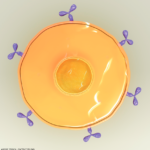Taken together, these studies demonstrate that patients with EGPA may safely use interleukin 5 blockade long term to keep their symptoms under control.
5. Clinical Characteristics of DADA2
Abstract 2647: Sharma et al.15
Deficiency of adenosine deaminase 2 (DADA2) is a monogenetic disorder characterized by systemic vasculitis, bone marrow failure and immunodeficiency.
Sharma et al. conducted a retrospective study of 101 patients with DADA2. The median age of disease onset was 17 years (range six months to 59 years), and it most commonly affected the skin (60%), central nervous system (including stroke in 35%), and gastrointestinal system (including mesenteric ischemia in 14%). Rare manifestations included amyloidosis, optic neuritis, pancreatic infarction and focal myocarditis. Risk factors for mortality included mesenteric ischemia, stroke and not receiving tumor necrosis factor inhibitor therapy.
Although DADA2 is often considered a pediatric diagnosis, this study highlights that over half of patients first become symptomatic as adults. This study also confirms the importance of using tumor necrosis factor inhibitors preferentially for the treatment of patients with DADA2, particularly for patients presenting with ischemic symptoms.
 Philip Seo, MD, MHS, is an associate professor of medicine at Johns Hopkins University School of Medicine. He served as the third physician editor of The Rheumatologist.
Philip Seo, MD, MHS, is an associate professor of medicine at Johns Hopkins University School of Medicine. He served as the third physician editor of The Rheumatologist.
Author’s Note
For those interested in the diagnosis and treatment of vasulitis and the latest research on the topic, the 22nd International Vasculitis Workshop will be hosted by the Australia and New Zealand Vasculitis Society (https://vasculitis-melbourne2026.com) on Feb. 21–25, 2026, in Melbourne.
References
- Merkel P, Penn S, Setty A, et al. Efficacy and safety of upadacitinib in patients with giant cell arteritis (SELECT-GCA): A double-blind, randomized controlled phase 3 trial [abstract]. Arthritis Rheumatol. 2024;76(suppl 9). https://tinyurl.com/msm2srve.
- Merkel P, Setty A, Blanco-Alonso R, et al. Efficacy of upadacitinib in patients with giant cell arteritis: Subgroup analysis of the SELECT-GCA phase 3 trial [abstract]. Arthritis Rheumatol. 2024;76(suppl 9). https://tinyurl.com/ykhtsbc3.
- Blockmans D, Penn SK, Setty AR, et al. A phase 3 trial of upadacitinib for giant-cell arteritis. N Engl J Med. 2025 May 29;392(20):2013–2024.
- Stone JH, Tuckwell K, Dimonaco S, et al. Trial of tocilizumab in giant-cell arteritis. N Engl J Med. 2017 Jul 27;377(4):317–328.
- Ytterberg SR, Bhatt DL, Mikuls TR, et al. Cardiovascular and cancer Risk with tofacitinib in rheumatoid arthritis. N Engl J Med. 2022 Jan 27;386(4):316–326.
- Stone J, Culver E, Khosroshahi A, et al. A phase 3, randomized, double-blind, multicenter, placebo-controlled study of inebilizumab in IgG4-related disease (MITIGATE): Primary efficacy and safety findings [abstract]. Arthritis Rheumatol. 2024;76(suppl 9). https://tinyurl.com/mr3c4abb.
- Stone JH, Khosroshahi A, Zhang W, et al. Inebilizumab for treatment of IgG4-related disease. N Engl J Med. 2025 Mar 27;392(12):1168–1177.
- Lou CY, Wang Y, Xing JY, et al. Comparison of inebilizumab or rituximab in addition to glucocorticoid therapy for neuromyelitis optica spectrum disorders. Int J Ophthalmol. 2024 Jun 18;17(6):1073–1078.
- Merkel P, Pagnoux C, Khalidi N, et al. A multicenter, randomized, controlled trial to evaluate the effects of low-dose glucocorticoids compared to stopping glucocorticoids to maintain remission of granulomatosis with polyangiitis: The TAPIR trial [abstract]. Arthritis Rheumatol. 2024;76(suppl 9). https://tinyurl.com/mfp7fh9w.
- Buttgereit F. Views on glucocorticoid therapy in rheumatology: The age of convergence. Nat Rev Rheumatol. 2020 Apr;16(4):239–246.
- Khoury P, Silver J, Wolff G, et al. Oral corticosteroid-sparing effects of mepolizumab in eosinophilic granulomatosis with polyangiitis (EGPA): Results up to 7.4 years from the long-term access programme [abstract]. Arthritis Rheumatol. 2024;76(suppl 9). https://tinyurl.com/33357jvu.
- Wolff G, Wechsler M, Silver J, et al. Long-term safety of mepolizumab in eosinophilic granulomatosis with polyangiitis (EGPA): Pooled results from two open-label extension studies [abstract]. Arthritis Rheumatol. 2024;76(suppl 9). https://tinyurl.com/bdhfkd4t.
- Wechsler ME, Akuthota P, Jayne D, et al. Mepolizumab or placebo for eosinophilic granulomatosis with polyangiitis. N Engl J Med. 2017 May 18;376(20):1921–1932.
- BLA 761070/S-021. Letter to AstraZeneca. U.S. Food & Drug Administration. 2024 Sep 17. https://www.accessdata.fda.gov/drugsatfda_docs/appletter/2024/761070Orig1s0021ltr.pdf
- Sharma A, Bhowmick N, Naidu S, et al. Clinical characteristics, treatment outcomes and predictors of mortality in a DADA2 cohort of 101 patients [abstract]. Arthritis Rheumatol. 2024;76(suppl 9). https://tinyurl.com/9y23m2wr.


